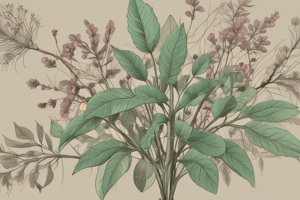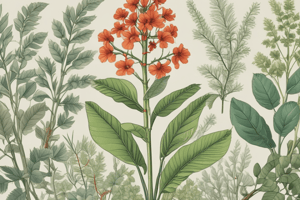Podcast
Questions and Answers
What is the primary function of chlorophyll in plant cells?
What is the primary function of chlorophyll in plant cells?
- To break down glucose
- To produce oxygen
- To absorb light energy (correct)
- To release carbon dioxide
What is the purpose of respiration in plants?
What is the purpose of respiration in plants?
- To break down water
- To absorb carbon dioxide
- To produce energy (correct)
- To release oxygen
What is the role of transpiration in plants?
What is the role of transpiration in plants?
- To produce oxygen
- To absorb nutrients
- To regulate temperature
- To transport water and minerals (correct)
What is the ideal pH range for most crops?
What is the ideal pH range for most crops?
What is the purpose of soil testing?
What is the purpose of soil testing?
What affects soil fertility and structure?
What affects soil fertility and structure?
Why is it essential to maintain proper humidity and temperature levels?
Why is it essential to maintain proper humidity and temperature levels?
What determines soil's water retention and drainage?
What determines soil's water retention and drainage?
What is the primary factor that affects root growth and water movement?
What is the primary factor that affects root growth and water movement?
What are the three essential macronutrients required by plants in large amounts?
What are the three essential macronutrients required by plants in large amounts?
What is the primary purpose of germination?
What is the primary purpose of germination?
What is the most critical phase of plant growth that requires adequate light, water, and nutrients?
What is the most critical phase of plant growth that requires adequate light, water, and nutrients?
What is the primary benefit of using integrated pest management (IPM)?
What is the primary benefit of using integrated pest management (IPM)?
What is the primary nutrient required for flowering and fruiting?
What is the primary nutrient required for flowering and fruiting?
What is the primary purpose of adding organic matter to soil?
What is the primary purpose of adding organic matter to soil?
What is the primary difference between macronutrients and micronutrients?
What is the primary difference between macronutrients and micronutrients?
Flashcards are hidden until you start studying
Study Notes
Basic Plant Biology
- Plants convert light energy into chemical energy through photosynthesis, which occurs in chloroplasts, using chlorophyll to convert CO2 and H2O into glucose and oxygen.
- Ensure plants receive adequate sunlight for optimal growth, with shade-tolerant plants needing less direct sunlight and sun-loving plants needing more exposure.
- Plants undergo respiration, breaking down glucose with oxygen to produce energy, CO2, and H2O.
- Balanced watering and proper spacing ensure good air circulation around plants, facilitating efficient respiration.
- Transpiration is the process of water movement through a plant and its evaporation from aerial parts, helping in nutrient uptake and cooling the plant.
- Maintain appropriate humidity and temperature levels to optimize transpiration rates.
Soil Science
- Soil is composed of minerals, organic matter, water, and air, with the balance of these components affecting soil fertility and structure.
- Regular soil testing determines soil composition and the need for amendments to optimize plant growth.
- Soil pH affects nutrient availability to plants, with most crops preferring a pH range of 6 to 7.5.
- Adjust soil pH using lime to raise pH or sulfur to lower pH, based on soil test results.
- Soil texture affects water retention and drainage, while soil structure affects root growth and water movement.
- Improve soil structure with organic matter to enhance water retention and root penetration.
Plant Nutrition
- Macronutrients (N, P, and K) are essential nutrients required in large amounts, often supplied through fertilizers.
- Use balanced fertilizers and adjust based on specific crop needs and soil test results.
- Micronutrients (Fe, Mn, Zn, Cu, Mo, B, and Cl) are essential nutrients required in smaller amounts.
- Ensure a balanced fertilization plan that includes both macro and micronutrients, as deficiencies can affect plant health and yield.
Plant Growth and Development
- Germination requires the right conditions of moisture, temperature, and oxygen.
- Ensure proper seedbed preparation and optimal planting conditions to enhance germination rates.
- Vegetative growth requires adequate light, water, and nutrients.
- Monitor and manage water and nutrient supply to support strong vegetative growth.
- Reproductive growth requires specific nutrients and environmental conditions.
- Pay attention to the specific needs of crops during this phase, such as increased phosphorus for flowering and fruiting.
Pest and Disease Management
- Integrated Pest Management (IPM) combines biological, cultural, mechanical, and chemical control methods to manage pests and diseases in an environmentally and economically sustainable way.
Studying That Suits You
Use AI to generate personalized quizzes and flashcards to suit your learning preferences.




